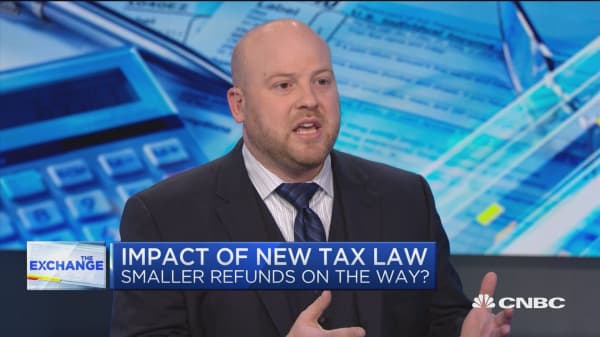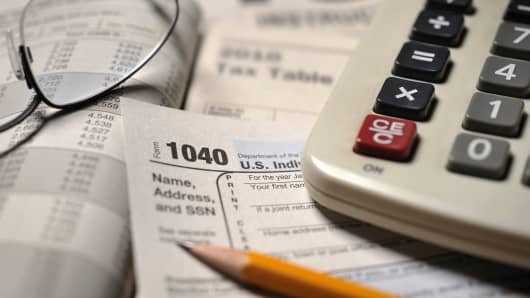If you are among the taxpayers expecting a refund this tax season, hold off on the champagne for a moment: A big check from the IRS isn't necessarily good news.
The taxman kicked off the new filing season on Jan. 28, marking the first time taxpayers will be submitting their returns under the Tax Cuts and Jobs Act. The agency predicts it will receive more than 150 million individual income tax returns this spring.
In just the first week of the new filing season, the IRS has sent out 4.6 million refunds to early birds.
The average refund check as of the week of Feb. 1 was $1,865, according to the IRS, which in turn set off howls of protest on social media from taxpayers who were expecting at least what they got last year.
Though there's no denying the feel-good factor of getting a fat check from Uncle Sam, it means you've likely overpaid your taxes during the prior year.
"A large refund from the IRS may seem like an advantage, but it isn't the best or most effective use of your cash flow," said Tim Steffen, CPA and director of advanced planning at Robert W. Baird & Co.
"You're basically giving the IRS an interest-free loan," he said.
Balancing withholding show chapters Here's how the new tax law could impact tax refunds 2:41 PM ET Fri, 8 Feb 2019 | 02:55
Here's how the new tax law could impact tax refunds 2:41 PM ET Fri, 8 Feb 2019 | 02:55 If you are an employee, when you were hired your employer gave you a Form W-4, which you can use to tweak the amount of tax that's withheld from your pay.
On that sheet, you can list the number of personal allowances you claim for your household. For instance, you can claim an allowance each for yourself, your spouse and your dependents.
Tread carefully: The more allowances you claim, the less tax you will have withheld.
"We urge people to check their withholding again this year to make sure they are having the right amount of tax withheld for 2019." -Chuck Rettig, IRS CommissionerIf you underpay your taxes during the year, you'll likely owe when you file your return.
"Some people read the form and think, 'I'm married and have three kids,'" said Cari Weston, director of tax practice and ethics at the American Institute of CPAs. "They end up with five allowances and owe substantial taxes at the end of the year."
To make things even more complicated, the IRS has adjusted its withholding tables and Form W-4 to reflect the changes from the Tax Cuts and Jobs Act. The agency has also released a new tax withholding calculator.
Because of the new tax law's increase to the standard deduction and the elimination of personal exemptions, now might be the best time to review your Form W-4 to see if you're withholding the appropriate amount of tax.
Last year's taxes FreezeFrameStudio | E+ | Getty Images
FreezeFrameStudio | E+ | Getty Images If you want to avoid the penalty for underpayment of estimated taxes, aim to pay 100 percent of the prior year's liability, said Jeffrey Levine, CPA and director of financial planning at BluePrint Wealth Alliance in Garden City, New York.
Though this won't guarantee you won't owe the IRS the following spring, it at least means the IRS won't hit you with penalties and interest for coming up short.
"If you see your tax rate increase substantially, you might owe a larger amount over the withholding," said Levine. "Aim for that 100 percent: It's a better method of avoiding the underpayment penalty."
This tax season, the IRS said it would waive the penalty for people who paid at least 85 percent of their total tax liability for 2018.
"We realize there were many changes that affected people last year, and this penalty waiver will help taxpayers who inadvertently didn't have enough tax withheld," said IRS Commissioner Chuck Rettig.
"We urge people to check their withholding again this year to make sure they are having the right amount of tax withheld for 2019," he said.
Here's how to evaluate your withholding and make sure it's just right for you.
Already filed? Look at your 2018 tax return: Whether you received a large refund or you wound up short with the IRS, your 2018 tax return is a guide to how your withholding currently looks under the new tax law.
Use that information to adjust your W-4.
Review your W-4: Striking a balance for withholding will be based on your salary, your spouse's earnings and the tax bracket you're in.
We're in a year with many changes to the withholding table, plus a reduction in federal income tax rates. You may be taking home a slightly larger paycheck, but you should make sure you aren't withholding too few taxes.
Talk to your accountant: Filers who withheld fewer taxes because they itemized on their returns will need to revisit their withholding. That's because the new law does away with a lot of itemized deductions and places a $10,000 cap on state and local tax deductions.
Fewer filers are expected to itemize in 2018 because the new tax law has doubled the standard deduction. Under the previous law, about 49 million taxpayers — roughly 3 in 10 individuals — filed itemized returns, according to the Urban-Brookings Tax Policy Center.
If you fall into that category, you may need to update your allowances in 2018 to ensure you're withholding the right amount of tax.
Calculating your withholding is more complicated if you have multiple sources of income, distributions from retirement accounts or cash from a rental property. You'll need to make estimated quarterly tax payments in those cases, Steffen said.
"Work with a CPA to do a projection and figure out what your tax liability will be at the end of the year," he said. "In a perfect scenario, you'll have a balance due when you file your return, but not one that's large enough to create a penalty."
Avoid tax arbitrage: If you withhold less in taxes because you have bigger plans with your paycheck, bear in mind that you'll owe Uncle Sam next year. Don't gamble your cash.
"Some people do foolish things: 'If I invest the money and make 7 percent this year, and I beat the IRS' penalty, then I'm ahead,'" said Levine. "If you've deliberately underpaid, the money should go someplace safe because this is a really short time horizon," he said.
More from Personal Finance:
Why squirreling away every spare dime in your 401(k) is a bad idea
Don't miss this retirement savings opportunity
The tax law has a bunch of new changes. What you should know
Subscribe to CNBC on YouTube.
No comments:
Post a Comment